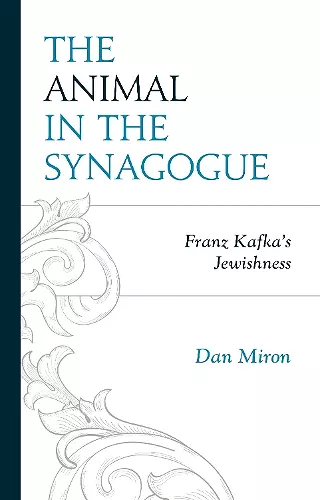The Animal in the Synagogue
Franz Kafka's Jewishness
Format:Hardback
Publisher:Bloomsbury Publishing PLC
Published:6th Sep '19
Currently unavailable, and unfortunately no date known when it will be back
This hardback is available in another edition too:
- Paperback£35.00(9781498595155)

Exploring the complexities of Jewish identity, The Animal in the Synagogue examines Kafka's struggles with modernity and tradition through his correspondence and literary works.
In The Animal in the Synagogue, the author delves into the intricate relationship between Franz Kafka’s identity as a Jew and his literary pursuits. The book posits that Kafka perceived his own experiences as emblematic of the modern Jewish struggle, caught between the aspirations of modernity and the weight of a historical past. This duality left him grappling with a sense of dislocation and existential vacuum, which is explored through his correspondence and writings.
The first part of the book focuses on Kafka’s complex self-perception regarding his Jewishness, drawing from his letters to Milena Jesenska and analyzing his short story 'In Our Synagogue.' Here, Kafka employs imagery of small animals to articulate his struggles with masculinity and the Jewish tradition. This exploration reveals a deep-seated ambivalence towards his heritage and the societal expectations tied to it.
The second part expands on Kafka’s literary context, examining his position within the broader spectrum of Jewish literature during his era. It discusses the three linguistic forms of Jewish writing—Hebrew, Yiddish, and German—and how Kafka navigated these realms. The author argues that Kafka’s skepticism about the potential for a harmonious blend of Jewish identity and modernity reflects a broader tension within Jewish literature, often overlooked in previous scholarship. The Animal in the Synagogue sheds light on these nuanced themes, contributing significantly to the understanding of Kafka’s literary legacy.
This excellent book offers a bright discussion of Kafka's being-Jewish, revealing the complexities of his life and letters as a German-Jewish author—dealing with "Kafka's impossibilities", illuminating the poetical and political aspects of his animal-writings, engaging so well his wit and darkness. -- Galili Shahar, Tel Aviv University
There is no dispute that Dan Miron is the most important scholar and critic of the 20th and the 21st century of Jewish literature as it materializes in Hebrew, Yiddish and German. From a bird’s view at the richness, the wisdom and the brilliance of his scholarship his new book, The Animal in the Synagogue: Franz Kafka's Jewishness, shines as the pinnacle of a scholarly project, the pillars of which Miron planted dozens of years ago. His courage and his scholarly greatness can be defined by his critique of the axiom that Jewish literature should be judged against the Zionist achievement of the establishment of Jewish sovereignty based on national territorialization. True to his personal and political pact with Modern Jewish literature, the State of Israel as the state of the Jewish nation was an option that as a Zionist he tied his life with. But his obligation to Jewish literature, in Hebrew and in other tongues, is clear-eyed and never blurs his rigorous stance as a philologist and as a historian. Well-versed in each and every detail of the vast spaces of Jewish literatures he turns now to tackle the Jewishness of Kafka’s oeuvre as part of the enormous variety and the richness of Jewish literatures while resisting their reduction. Thus, in a brilliant discussion of the Modern Jewish literary context, he studies the way in which literature expresses Kafka’s Jewishness. -- Hannan Hever, Yale University
Dan Miron combines huge erudition with interpretive courage that reminds what humanist interpretation should be about. Miron provides us with a deep, insightful, and inspiring reading of Kafka. Miron takes the reader on a courageous and convoluted literary and philosophical journey. A significant, imaginative, unique and bewildering journey, in which a Jewish version of the Nietzschean image of “dancing upon the abyss” is performed perfectly both by Miron and his hero. -- Shoshana Ronen, University of Warsaw
ISBN: 9781498595131
Dimensions: 236mm x 160mm x 19mm
Weight: 435g
166 pages